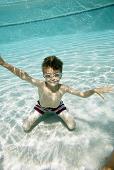
“The only person who behaves sensibly is my tailor. He takes my measure every time he sees me. All the rest go on with their old measurements.”
-George Bernard Shaw
I was reminded of the importance of on-going assessment while watching my children swim at the neighborhood pool. My children have taken lessons and know how to swim, but they were trying to dog paddle to reach the other side of the pool. I know I sometimes make connections from A t0 W to L, but hang with me on this one.
My junior year in college I transferred to a different state university. The dean of the college of education told me I had to take a physical education class. I had been told to agree with whatever he said or it would become worse. So, I decided to take swimming. I thought it would be easy since I’d taken swimming lessons my entire life and was at the junior life-saving level. (I know no one out there has ever taken a college-level course just because it would be easy, right?)
On the first day of class I forgot my goggles. I decided not to open my eyes while the instructor watched us take our “test” lap across the pool. Somehow, since I didn’t open my eyes, I went the wrong way. After a few minutes, I sputtered up. The instructor looked at me and immediately said, “Beginner level. You can go sit next to the shallow pool.” That one lap served as my permanent assessment of swimming abilities. She never asked me what I knew about swimming. She never again gave any of us an assessment of what we had learned to move us to the next level. She took our measure the first day, labeled us, and just kept on teaching.
The beginning level group of swimmers soon realized I knew how to swim, but they didn’t tell anyone else–especially the instructor! (Sound like any classes you’ve taught?) Every class period for weeks, I came to class, got a kick board and practiced floating. It was a waste of a semester, but it has been the best illustration of the danger of assessing only once. On-going assessment, sometimes known as Clipboard Cruising, is an essential element in every effective classroom. This clip, from the new Tabor Rotation Training Series, gives a good visual for what it looks like in a classroom.
[vimeo]http://www.vimeo.com/23382323[/vimeo]
As for my “dog paddling” experts in the pool…I closed my semi-wet summer read of “Friday Night Lights,” went to the edge of the pool, and reminded my children how much faster they move when they use the strokes they know. They both laughed, turned, and kicked water all over me and my book! The Texas sun took care of drying the book…

